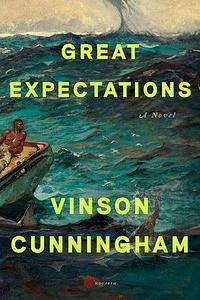Take a photo of a barcode or cover
medium-paced
Plot or Character Driven:
A mix
Strong character development:
No
Loveable characters:
Yes
Diverse cast of characters:
Yes
Flaws of characters a main focus:
No
A strong start but the books flails halfway through. Cunningham does cleverly describe people’s voices and manner of speech and manages to make the arc of the campaign suspenseful even though you know exactly what will happen. But the parts that are not focused on the campaign and instead on the main character’s (aka Cunningham’s) own life are drifting and aimless.
hopeful
reflective
medium-paced
Plot or Character Driven:
Character
Strong character development:
Complicated
Loveable characters:
Complicated
Diverse cast of characters:
Yes
Flaws of characters a main focus:
Complicated
challenging
reflective
medium-paced
Cunningham is a wonderful descriptive writer. Renoir, Aaron Copland, even the majestic hip checks of Paul Pierce: he writes about each an all with a keen eye (or ear) for detail. Moments of great and of no import receive the same careful treatment. Here our narrator is walking into a temporary tent structure:
I looked up: the interior of the tent was taut, rising into tight peaks and throwing parabolic shadows, often doubled—darker, lighter, overlapping—onto itself. Bright lights, nearly forensic, were affixed to the poles that held it up. Its surface looked soft. The wind picked up a time or two and ripples shuddered harmlessly across the tent's hueless expanse.
Here, Cunningham has a fine eye and great skill with sentence structure and rhythm. But y'all–we're less than three pages from the end of the novel here. Can we not say, "We walked into the tent" and get to what matters?
Part of my complaint about this novel might just be my distaste for meta-fiction, in which events transpire because they transpired rather than because they are thematically or structurally necessary. I think I would like this better if I conceived of it as a progress between exquisite descriptions, because as a novel of consequential events—it does after all transpire on the campaign trail during the closing months of the first Obama campaign—it doesn't hold up. If moves like a "drifting novel," like say [b:Open City|8526694|Open City|Teju Cole|https://i.gr-assets.com/images/S/compressed.photo.goodreads.com/books/1327935192l/8526694._SY75_.jpg|13393712], but the setting promises a very different novel.
All in all, this didn't work for me, but Cunningham's gifts are such that I'm already queued up for his next novel. This one was frustrating, but I believe he has a great book in him.
I looked up: the interior of the tent was taut, rising into tight peaks and throwing parabolic shadows, often doubled—darker, lighter, overlapping—onto itself. Bright lights, nearly forensic, were affixed to the poles that held it up. Its surface looked soft. The wind picked up a time or two and ripples shuddered harmlessly across the tent's hueless expanse.
Here, Cunningham has a fine eye and great skill with sentence structure and rhythm. But y'all–we're less than three pages from the end of the novel here. Can we not say, "We walked into the tent" and get to what matters?
Part of my complaint about this novel might just be my distaste for meta-fiction, in which events transpire because they transpired rather than because they are thematically or structurally necessary. I think I would like this better if I conceived of it as a progress between exquisite descriptions, because as a novel of consequential events—it does after all transpire on the campaign trail during the closing months of the first Obama campaign—it doesn't hold up. If moves like a "drifting novel," like say [b:Open City|8526694|Open City|Teju Cole|https://i.gr-assets.com/images/S/compressed.photo.goodreads.com/books/1327935192l/8526694._SY75_.jpg|13393712], but the setting promises a very different novel.
All in all, this didn't work for me, but Cunningham's gifts are such that I'm already queued up for his next novel. This one was frustrating, but I believe he has a great book in him.
I thought this was fine. I liked that the Senator was not named. This was not his story. I prefer this - a side character story vs books that take a still alive famous person and novelize their story
The writing is good, I liked the pacing. Overall though it is a book that didn't make an impact on me and I will probably forget I read it by end of the year.
I would read the author again.
The writing is good, I liked the pacing. Overall though it is a book that didn't make an impact on me and I will probably forget I read it by end of the year.
I would read the author again.
slow-paced
Plot or Character Driven:
A mix
Strong character development:
No
Loveable characters:
No
Diverse cast of characters:
Yes
Flaws of characters a main focus:
No
reflective
medium-paced
Plot or Character Driven:
Character
Strong character development:
No
Loveable characters:
Complicated
Diverse cast of characters:
Yes
Flaws of characters a main focus:
Complicated
This was a challenging ambitious novel. A young Black man has a promising life trajectory derailed and seems resigned to a life in limbo, carrying the weight of unrealized potential.
He then falls into a junior staff role with a longshot campaign for a young Senator from Illinois seeking to become the first Black President of the United States. The Candidate is never named, and with good reason. We all know who he is, but the book isn’t really about him as a person. Instead, the novel reflects on what his campaign forced people to examine (or re-examine) about themselves and each other.
The author effectively sets the Candidate at a distance from the novel’s action; he’s less of an active presence and more of a conceptual canvas for the main character and those he encounters to project the expectations they’d had for their own lives. I found this an interesting framework for what ended up being a series of reflective meditations. Some of the themes included religion, art, race, family dynamics, and of course the aspirational pursuit of power. I didn’t click with all of it; some sections dragged a bit for me when I was hoping to find a bit more momentum.
That said, I love books about characters exploring their identity. I’m glad to have to read one that came at it from such a fascinating angle.
He then falls into a junior staff role with a longshot campaign for a young Senator from Illinois seeking to become the first Black President of the United States. The Candidate is never named, and with good reason. We all know who he is, but the book isn’t really about him as a person. Instead, the novel reflects on what his campaign forced people to examine (or re-examine) about themselves and each other.
The author effectively sets the Candidate at a distance from the novel’s action; he’s less of an active presence and more of a conceptual canvas for the main character and those he encounters to project the expectations they’d had for their own lives. I found this an interesting framework for what ended up being a series of reflective meditations. Some of the themes included religion, art, race, family dynamics, and of course the aspirational pursuit of power. I didn’t click with all of it; some sections dragged a bit for me when I was hoping to find a bit more momentum.
That said, I love books about characters exploring their identity. I’m glad to have to read one that came at it from such a fascinating angle.





